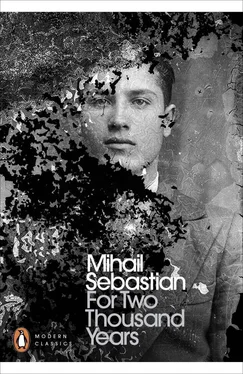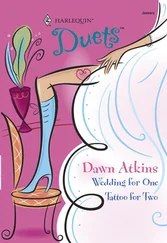*
Ça fait toujours une petite expérience , says Maurice Buret of his most recent success at the Coupole. Experiences, always experiences, only experiences. Life’s only merit for this fellow is that it is observable. He always has with him an invisible register, in which he carefully notes a multitude of systematic conclusions. Each person has his file, every feeling has its chapter. He calls this exercise du jardinage , ‘tending the garden’, and he is well equipped.
‘You’re a Cartesian, my dear Maurice, one of the most unfortunate cases.’
‘Oh? I didn’t know that. I read Descartes at school, but I’ve forgotten him.’
I read him a few lines from Discours de la Méthode . He listens attentively.
‘Indeed, that does fit me. But Descartes isn’t my master. Too abstract. Anecdotes are what interests me, and only truths conveyable through anecdotes. I’m not a philosopher. I’m just curious. At most — and I’m saying this just to please you — at most I’m a psychologist.’
I see him occasionally. He may be missing for two or three weeks, then turn up one morning, out of nowhere, with a vast harvest of events, discoveries and sensations. He operates on a number of fronts, which are not allowed to mingle. He lives among a number of groups of people which he does not mix, maintains several friendships which he carefully keeps separate from one another, and cultivates a number of well-guarded love affairs.
‘You see, my good friend, life would be impossible if it weren’t organized properly. I have only one bed and there are a thousand beautiful women, I have only one telephone number and there are a thousand interesting conversations. Much discretion is required in order to make the correct choice, to move ahead quickly and with little risk.’
Without doubt, Maurice Buret has enough love affairs for three lives. He lives all three at once and keeps close tabs on them. Firstly there’s his very serious life at the university, the laboratory and the clinic.
In the two years since passing his internship exams, he has published a number of authoritative papers. So there is Maurice Buret the ‘young savant’, who is sober, stern and reserved. In this role, he has a ‘complex’ love affair with a young ‘passionate, dark’ nurse whom he went to bed with for the first time enthusiastically, after a long technical discussion about gold salts.
And then there’s the second Maurice Buret, the easy-going man about town, a Parisian Maurice, well-read, intelligent and gallant, well received in diplomatic circles and very successful in the great salons. In this second role he has other and more varied love affairs, from the adulterous to the innocent, from the heart-breaking to the frivolous.
Then, finally, comes Maurice Buret the moralist, the director of the previous two, observer and cynic, reader of books, judge of people, seeker of interesting psychological cases. It’s the version I first knew and the one I prefer. Does this continual shuttling between different mind-sets not tire him out? Judging from his excellent health, it seems not.
‘Maurice, you’re a master.’
‘Let’s not exaggerate. All games are complicated when you’re not familiar with them, and very simple when you are. I know the game — that’s all. I always know what I want and I know where to find it. Do I need a cynical love affair? The dark Christine can always be found between five and seven at the laboratory. But perhaps I need a sentimental interlude? Fair Alice Vignac can be contacted through the operator at 14–99. I need frenzied conversation with metaphysical exhortations? Robert Grévy is at his editor’s desk every night from twelve to two. I’m interested in social issues? Bertrand is always well informed. I finally want to give all these stories a certain order, to classify them, to taste them, to judge them. You’re here and suit my requirements perfectly.’
‘But what you’re saying is monstrous. Where are you among all these experiences? Which one is you? The cynic? The sentimentalist? The sceptic? I fear you’re nothing. You live by being reflected in others. You’re something very artificial: you’re the raisonneur of the comedy.’
‘I don’t dislike the role and I accept it — minus the compassion you extend to me. I take delight in my way of life It consists in asking of each person precisely what he’s able to give you. Think of any emotional scene you know and you’ll see that it arises from an inappropriate demand being made. My whole philosophy can be reduced to one precept, which I warmly recommend to you: “There’s no point riding a calf in the hope it’ll become a stallion.”’
*
But the most wonderful thing about Maurice Buret isn’t his passion for analysing people, it’s his lack of a moral sensibility. More still, it’s his feeling for vice, his curiosity about the twisted. He’s a healthy, orderly fellow with a strong sense for what’s appropriate, a sense of balance inherited from his provincial bourgeois family. He’s a Breton, from a nation of merchants and sailors.
That doesn’t prevent him looking for, and provoking when needs be, various ‘scandalous acts’. For two months he was in love with Germaine Audoux. To my amazement, as it was one of his longest love affairs, and nothing explains such constancy to a girl who is perhaps not ugly but is certainly no beauty. I discovered the secret one day when Maurice had wound up the chapter with Germaine with all the necessary details: she was addicted to ether.
‘You’ve no idea how instructive it is. At the clinic I’ve only come across cases of severe intoxication, and in the manuals only generalizations. Without Germaine, ether would have been something abstract. With Germaine, it’s a drama.’
I’d like to burst out with: ‘But what are you, a machine for recording dramas? A detective? A psychological secret agent? A dabbler in souls?’ But I stop myself in time. The one feeling Maurice is incapable of is indignation.
He’s probably the most intelligent man I’ve ever known, because that’s all there is to him. Nothing else: neither moral nor immoral, neither good nor bad. Intelligence for him takes the place of sensitivity. There are emotions and nuances that he can’t help but feel. He understands them. He doesn’t have instincts, he doesn’t have reflexes: he orients himself through awareness. I wonder what he would do if caught up in a great passion, one that devastates him, consumes him and overwhelms him … Ridiculous! There’s no chance of such a person having to face this kind of passion. Maurice would be up to imposing order on a cyclone.
Wherever he goes, he finds out how to orient himself. In a crowd of people or in a symphony, in a landscape or in a book, his first concern is to establish north and south. Then, knowing the route back, he allows himself to get adventurous. ( S’égarer est un plaisir délicieux, à condition que la route de Paris ne soit pas éloignée .)
*
At the moment, Maurice is taking care of the Robert Grévy — Jacques Bertrand business. ‘A must-be couple’, he’s engraved in his imaginary notebook under the heading ‘Robert’, the day he introduced him to Jacques.
‘But Bertrand isn’t homosexual,’ I object, scandalized.
‘He will be. He has what it takes.’
‘And Robert Grévy?’
‘Used to be. Filled with nostalgia.’
Robert Grévy is married. His wife, Suzanne, who knows certain things about his past, doesn’t let him out of her sight. She’s a fiery, watchful wife.
‘As long as Suzanne’s around, there’s nothing doing,’ observes Buret, summing it up. Then he decides: ‘Suzanne needs to take a little trip.’
Tuesday, lunch with the Grévys.
Читать дальше












